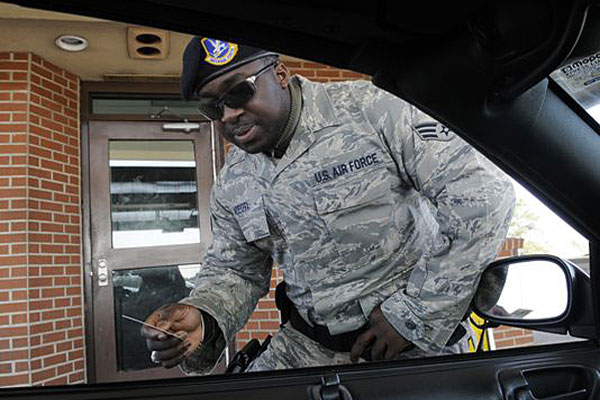 NORTHCOM Raises Threat Levels at U.S. Military Installations
NORTHCOM Raises Threat Levels at U.S. Military Installations
Military.com May 09, 2015 | by Bryant Jordan
Gate guard. Sue Sapp/Air Force
For the first time since the tenth anniversary of the 9/11 attacks U.S. Northern Command has upped the threat level to military bases across the country.
Preston Schlachter said the raised level is “not tied to any kind of specific threat,” but does represent a change.
“The sporadic random elevation of our force protection is going to be our new normal,” he told Military.com on Friday.
He said base commanders will make their own calls on what they choose to do to increase security.
The Air Force Academy in Colorado Springs, Colorado, for example, will be closed to all non-Department of Defense identification card holders until further notice. Any visitors to the base will have to be accompanied by authorized personnel with a DoD ID, academy officials said, and visitor access for official events will be permitted on a case-by-case basis.
There are five threat conditions to DoD Force Protection Levels, including Normal, Alpha, Bravo, Charlie and Delta.
Normal, which calls for routine security measures, has not been used since the 9/11 attacks, Schlachter said.
Alpha, which has been the standard threat level for the past 15 years, indicates possible terrorist activity.
The NORTHCOM directive on Friday raised the level to Bravo, which indicates “predictable terrorist threat activity exists,” according to the Defense Department’s Terrorist Threat Levels. The last time condition was raised to Bravo was during the 10th anniversary of the 9/11 attacks, Schlachter said.
Charlie indicates officials have reason to believe terrorist targeting of military personnel and facilities is imminent, while Delta indicates terrorist action is imminent.
-- Bryant Jordan can be reached at This email address is being protected from spambots. You need JavaScript enabled to view it..
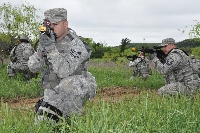
445th SFS completes Patriot Defender training
Posted 5/4/2015 Updated 5/5/2015
by Capt. Elizabeth Caraway
445th Airlift Wing Public Affairs
5/4/2015 - FORT WOLTERS TRAINING CENTER, Texas -- Thirty-seven Airmen from the 445th Security Forces Squadron tackled Patriot Defender, a two-week combat readiness training course, here Apr 6-18, 2015.
Patriot Defender takes SFS troops through skills training for core security forces tasks including entry control point operations, urban operations, land navigation, counter improvised explosive devices, tactical communication, and weapons firing. Every Airman was also certified in Humvee operations.
The classes were taught by cadre from the 610th SFS, Naval Air Station Fort Worth Joint Reserve Base, Texas.
"This is the time and place to make wrong decisions, rather than out there [at deployed locations]," said Staff Sgt. Johnny Holliday, 610th SFS ground combat skills instructor, emphasizing that Airmen should ask questions, not be afraid to make mistakes, and be proactive.
Patriot Defender offered "hands-on training that was more fun and helpful than classroom instruction alone," said Senior Airman Peter Nicoll, 445th SFS fire team member. "I definitely feel more prepared for future deployments."
Of all the field exercises, Nicholl's said he enjoyed urban operations best because it encapsulated what SFS is about: "Working as a team, communicating, and working toward an objective."
For several of the Airmen, it was their first experience with any of the core security forces tasks. Tech. Sgt. Stephanie Blevins and Airman First Class Taylor Young work in the 445th SFS orderly room but asked to attend the training because, "if you're going to work with a unit, you need to know what they do," insisted Blevins. "They look at you differently and you'll understand them better." Both she and Young said they enjoyed the experience and gained respect for the career field.
The unit first sergeant, Master Sgt. Jonathon LeMaster, also chose to attend. He, like all the 445th SFS senior leadership, elected to participate in the training as students, rather than in supervisory roles.
"It's a good way for my Airmen to see what I know," said Maj. Charles Trovarello, 445th SFS commander, "and to see that I'm willing to learn. It's also a great way for me to get to know my defenders and for them to get to know me. The training has been strenuous, but extremely beneficial."
Chief Master Sgt. Bryan Cepluch, 445th SFS superintendent, has attended Patriot Defender training eight times but said, "This has definitely been the best."
Patriot Defender culminates in a field exercise that incorporates all the previous training.
Tech. Sgt. William Hinman, 610th SFS cadre team leader, was impressed by the 445th SFS teamwork.
"They're great," said Hinman. "It's nice to have a team that has clearly done some quality training together on station before they arrive. This has probably been one of the better flights we've had in the last couple years."
Echoed ground combat skills instructor Tech. Sgt. Nathan Hagin, "They've shown some of the best communication we've seen yet. They did a good job coordinating the battle field."
Trovarello said that attending the training allowed him to observe that "my Airmen are motivated and knowledgeable. No one grumbled or complained. When asked, they step up immediately."
Several members of the 445th SFS were singled out for exemplary performance during Patriot Defender. Tech. Sgt. Ryan LaMarr was named top NCO; Maj. Charles Trovarello was chosen for the leadership award; and the squad led by Tech. Sgt. Timothy Sexton--A flight, Squad 1--was the recipient of best squad.
Photo: FORT WOLTERS TRAINING CENTER, TEXAS - Tech Sgt. William Akers and Master Sgt. William Speakman, 445th Security Forces Squadron, take positions during a Patriot Defender training practical April 14 at Fort Wolters Training Center, Texas. The two-week sustainment course takes SFS troops through the paces of core security forces tasks. (U.S. Air Force photo/Capt. Elizabeth Caraway)
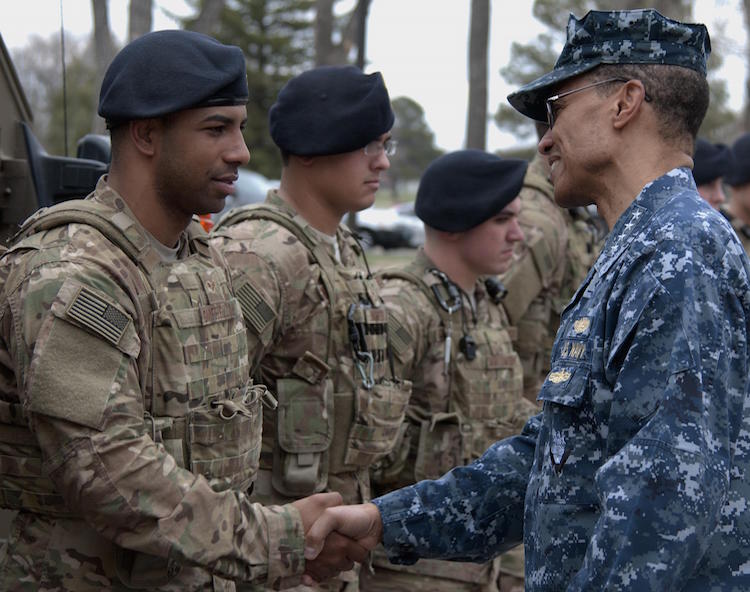 STRATCOM commander hosts ICBM stakeholders meeting
STRATCOM commander hosts ICBM stakeholders meeting
By Airman 1st Class Brandon Valle, 90th Missile Wing Public Affairs / Published April 30, 2015
F.E. WARREN AIR FORCE BASE, Wyo. (AFNS) -- During his visit to F.E. Warren Air Force Base April 27-28, Navy Adm. Cecil D. Haney, the U.S. Strategic Command commander, reinforced how essential the intercontinental ballistic missile mission is, and some face to face engagement allowed Haney to seek bottom-up feedback from Airmen of all ranks.
"As commander of (U.S.) Strategic Command, my top priority is to deter and detect strategic attack against the United States of America and its allies," Haney said. "The ICBM capability here at F.E. Warren is used 24/7, 365 days a year, in terms of that deterrence mission."
As the commander of STRATCOM, Haney is responsible for the global command and control of strategic forces, providing a broad range of capabilities and options for the president and the secretary of defense.
"As I look at my capability, whether it's the responsiveness of the intercontinental ballistic missile force, the survivable nature of our submarines or the flexibility and visibility of our strategic bombers, all three are important parts of the U.S. Strategic Command mission," he said. "And as such, I value what goes on here at F.E. Warren."
"Airmen see the interest leaders have in those on the ground and how new equipment improves or hinders our performance," said Master Sgt. April Borecki, the 790th Missile Security Forces Squadron convoy commander. "Their opinions and decisions can have a dynamic effect on future personnel."
The admiral's visit to F.E. Warren was twofold: he not only engaged with the men and women who carry out the mission every day, he also chaired an ICBM stakeholders’ meeting with various Defense Department officials who have a vested interest in ICBM operations.
"This is a forum that allows me to listen to our leadership," Haney said. "We can meet as one team and look at how we can sustain this very important capability for the U.S."
Stakeholders’ meetings assess the health and direction of the nation's strategic forces, including bomber, ICBM and submarine forces, as well as the communication networks and sensors that tie them all together.
Photo: Navy Adm. Cecil Haney, head of US Strategic Command, shakes hands with SrA. Shaan Shaffeeullah at F.E. Warren AFB, Wyo., April 28, 2015. Air Force photo by A1C Brandon Valle
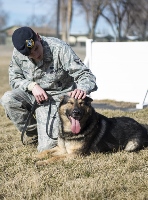
By Senior Airman Malissa Lott, 366th Fighter Wing Public Affairs / Published April 29, 2015
Staff Sgt. Benjamin Vanney, a 366th Security Forces Squadron military working dog (MWD) handler, sits with Rony Feb. 24, 2015, at Mountain Home Air Force Base, Idaho. By playing, Ronny and Vanney have formed a bond which is a crucial part of the MWD team. (U.S. Air Force photo/Senior Airman Malissa Lott)
MOUNTAIN HOME AIR FORCE BASE, Idaho (AFNS) -- (This feature is part of the "Through Airmen's Eyes" series on AF.mil. These stories focus on a single Airman, highlighting their Air Force story.)
Walking through the 366th Security Forces Squadron dog kennel, barking erupts from all directions. Staff Sgt. Benjamin Vanney makes his way to his new military working dog (MWD), Rony. He smiles at the sight of Rony jumping around in excitement, ready for a new day of training.
Having only been together for a week, the two are still getting to know each other. Developing a bond between handlers and their dogs is vital to the success of the military working dog team.
A MWD handler with the 366th SFS, Vanney has loved dogs since he was a child. Unfortunately, his parents seemed less enthusiastic about owning a pet.
"When I was a little kid, my parents wouldn't let us have a dog," Vanney said. "I created a presentation of why we needed one. I remember stating the facts and making all these promises."
He promised his parents he would take responsibility, even if it meant waking up in the middle of the night to care for the dog.
Shortly after returning from a vacation years ago, his parents greeted him with strange behavior.
"I couldn't figure out why they were keeping me from going through the garage door. They followed me through the front door. There was a staircase leading all the way up and that's where my mom was with the puppy in her lap. I think I cried - I was so excited," Vanney said.
It was then Vanney said he knew dogs would serve an important role in his life. As a new Airman, He didn't initially think about dog handling, but once the opportunity arose, he jumped at it.
"It sounded like a calling," Vanney said.
His first puppy and basic training have long passed, but said he still finds enjoyment in training his new dog Rony.
"You try to build that bond, build a rapport and make a friendship out of it at first," Vanney said.
He remembered his first encounter with Rony. Rony initially hid from him, but couldn't mask his excitement when Vanney grabbed his leash.
"I could tell I had my hands full right off the bat," Vanney said.
For some, going in to work on their free time to take care of work would seem like an unnecessary sacrifice. For Vanney though, it's not only a necessity, it's an opportunity. It's a chance to bond with his dog and allow Rony to completely trust him.
"I'm constantly coming in on my off-time," Vanney said. "When I go fishing on my days off, I stop by and play with Rony for an hour or two. The biggest thing is the passion for it, because it's a lot of hard work."
The patience, care and time he provides for Rony is a testament to the bond handlers share with their dogs. It's a bond that keeps each other going during difficult times, especially deployments.
"When you have the opportunity to deploy downrange with a military working dog, they're your link to home," said Master Sgt. Christopher Ebeling, the 366th SFS MWD section NCO in charge. "Your dog stays with you in your room or you stay in the compound with your dog. You have access 24/7 to your dog. It's a great stress reliever that makes being away from home so much easier."
Vanney said, "You have this animal that you're caring for so it takes your mind off of being away from home. At the same time, they relax you and cheer you up."
Despite creating an incredible bond there will be a time when this bond has to be severed. And all handlers will have to experience this, whether due to personnel changes or mission needs. Before working with Rony, Vanney was teamed with another dog named Vvass.
"It's hard," Vanney said. "Especially when you're seeing (the dog) go to another person. I've walked past Vvass' kennel every day and it isn't exactly the easiest because he sees me and he whines; I miss him."
Even though the process of moving on to another dog is difficult, the experiences stay with him as he works with Rony. Still, despite the challenges, he wouldn't want to change a thing. Experiencing these changes has continued to push Vanney to be better for each of his dogs
"I will always remember my dogs as I continue my career," Vanney said.
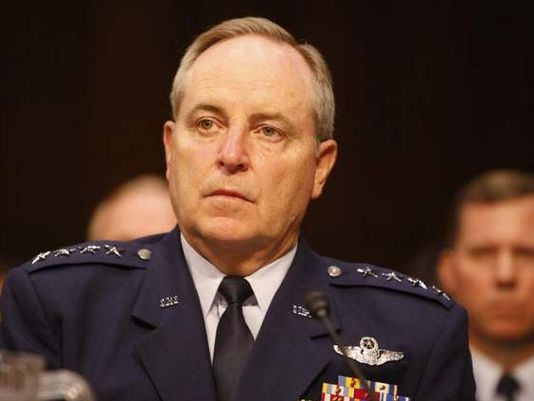 Welsh: Force management is done, so refocus on mission
Welsh: Force management is done, so refocus on mission
22 Apr 2015 Air Force Times
By Stephen Losey, Staff writer
Chief of Staff Gen. Mark Welsh on Wednesday urged airmen to put their concerns about force cuts and possible changes to health care and retirement programs behind them and renew their focus on the service's mission.
In his latest Airman to Airman video, Welsh said that last year's force management cuts are among several things distracting airmen recently.
But he reiterated Air Force Secretary Deborah Lee James' pledge to not use involuntary force-shaping measures in the next few years, and said airmen need to spend 2015 "to kind of reset our focus on the fight."
"There's been lots of disruption to the force as we went through that very, very difficult and painful time for a lot of airmen and their families," Welsh said. "What I'd like you to do is remember that we're past that now. We need to keep our Air Force exactly the size we have it right now in order to do the job that we've been asked to do. Everybody who's in the Air Force today is with us moving forward."
Welsh said it's the job of Air Force headquarters officials and other officials in Washington to provide the resources, education and training to fight and win the nation's wars.
"I ask you to trust us to get that done," Welsh said.
Welsh also noted that concerns about sequestration, and possible changes to retirement plans and medical care have also worried airmen. But he said airmen should not worry.
"Nobody's going to hurt you on the pay side of the house," Welsh said. "Nobody's going to make retirement something you won't be very satisfied with. And nobody's going to take health care away from you and your families. The Air Force isn't going to allow it, the Department of Defense is not going to allow it and Congress is not going to allow it. So let us work the details of those programs, and you focus on getting the job done."
Welsh concluded his video by reminding airmen that they represent the best Air Force in the world.
"Stay proud of who you are," Welsh said. "Stay proud of the people you stand beside, and get better at our job every single day. We'll take care of the rest. Trust me on that."
Page 10 of 14


